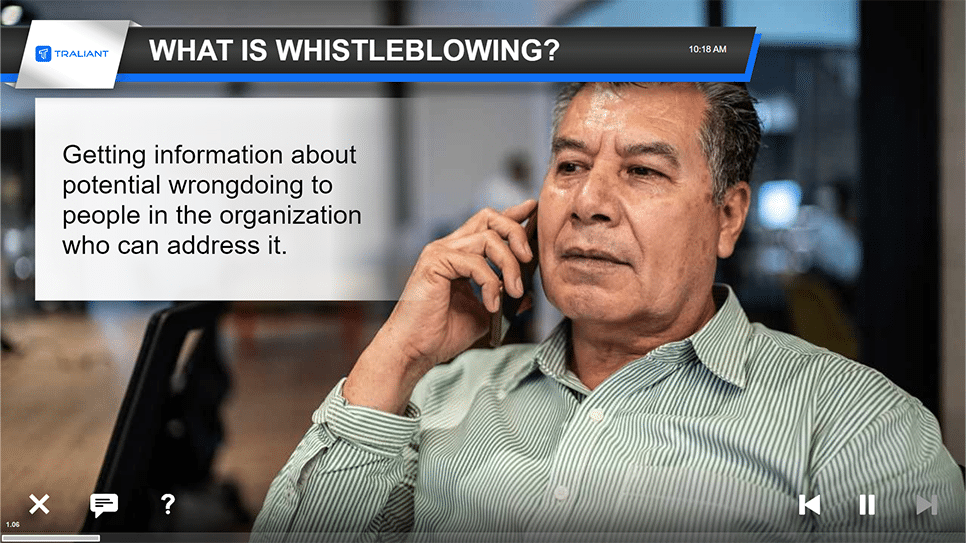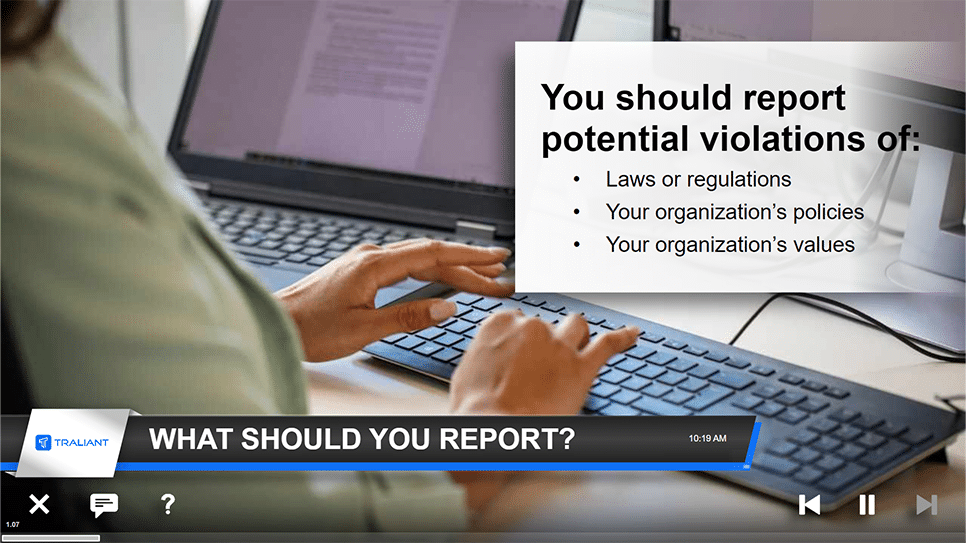
Whistleblowing
Foster a speak-up culture and empower your employees to expose misconduct to help build a foundation for a more ethical workplace.
Course description
Traliant’s Electrical Safety training is a 30-minute course that explains the basics around electrical safety and the common risks related to power lines, cords, power tools and sockets. Additionally, the course covers Lockout/Tagout procedures, the dangers of working with electricity and best practices to keep workers and others safe.
This course aligns with the Occupational Safety and Health Administration’s (OSHA) general industry programs and focuses on the fundamental principles of electricity and its associated hazards and danger points.
ONLINE TRAINING
Whistleblowing: The Importance of a Speak-up Culture

This course covers these topics and more:
- What is whistleblowing?
- Benefits of whistleblowing
- Types of concerns that can be reported
- Reporting and reporting channels
- Retaliation protections
- Management do’s and don’ts
KEY FEATURES
Why you'll love our training
It’s time to embrace a new era of online training with a valued partner who will ensure seamless implementation, along with a learning experience your employees will truly enjoy.
Course administration
Traliant makes it simple to roll out training to your workplace and provide technical support directly to your employees at no additional cost.
Course customizations
Tailor courses to include your logo, relevant policies, workplace images, and more. Traliant can even customize the course with scenarios that take place in your own workplace environment.
Translations
Training is available in English, Spanish and is supported in over 100 languages.
What to consider when choosing the most effective whistleblowing training

- Promote a culture of ethical conduct: Whistleblowing training helps to create a culture where employees feel comfortable and empowered to report misconduct without fear of retaliation.
- Minimize legal and financial risks: Failing to address misconduct can lead to lawsuits, fines, and damage to the organization's reputation. Training helps to mitigate these risks.
- Protect the organization and its stakeholders: Whistleblowing helps to uncover wrongdoing that can harm the organization, its employees, or its customers.
- Empower employees: Training provides employees with the knowledge and skills they need to understand their role in reporting misconduct and to act responsibly.
- Strengthen your organization's commitment to ethical behavior: Training demonstrates the company's commitment to a workplace where employees feel comfortable speaking up about wrongdoing.
- Reduce the risk of harm: Training helps to create a culture where employees are more likely to report misconduct, which can help to prevent harm to the organization, its employees, or its customers.
- Illegal activities: Violations of laws or regulations.
- Unethical behavior: Violations of the company's code of ethics or conduct.
- Fraud: Deceptive or dishonest practices.
- Safety violations: Conditions that pose a risk to the health or safety of employees.
- Harassment: Discriminatory or harassing behavior.
- Improved compliance: Whistleblowing helps to ensure that organizations are complying with laws and regulations.
- Reduced risk of harm: Whistleblowing can help to prevent harm to employees, customers, or the organization's reputation.
- Enhanced ethical culture: A strong whistleblowing culture encourages employees to report misconduct and to uphold ethical standards.
- Increased accountability: Whistleblowing holds individuals and organizations accountable for their actions.
- Reporting channels: Know how to report concerns, including the available reporting channels, such as an ethics hotline or a designated reporting officer.
- Retaliation protections: Understand the legal protections against retaliation for reporting misconduct.
- Confidentiality: Understand the confidentiality procedures and how your information will be protected.








